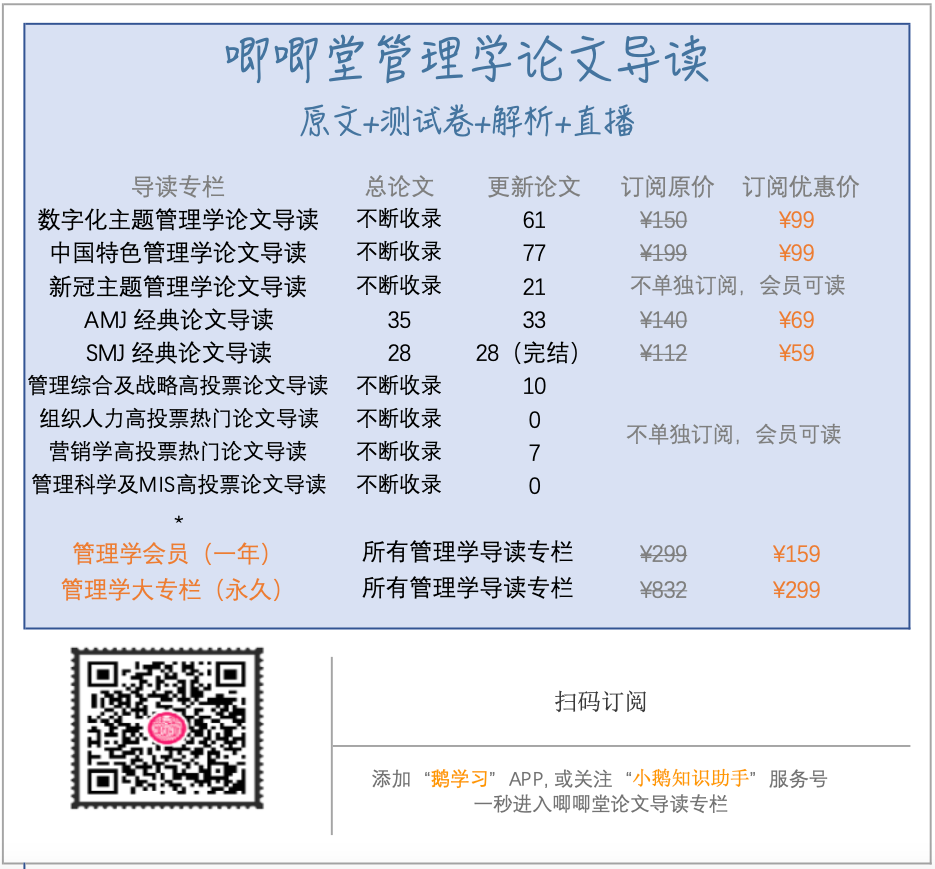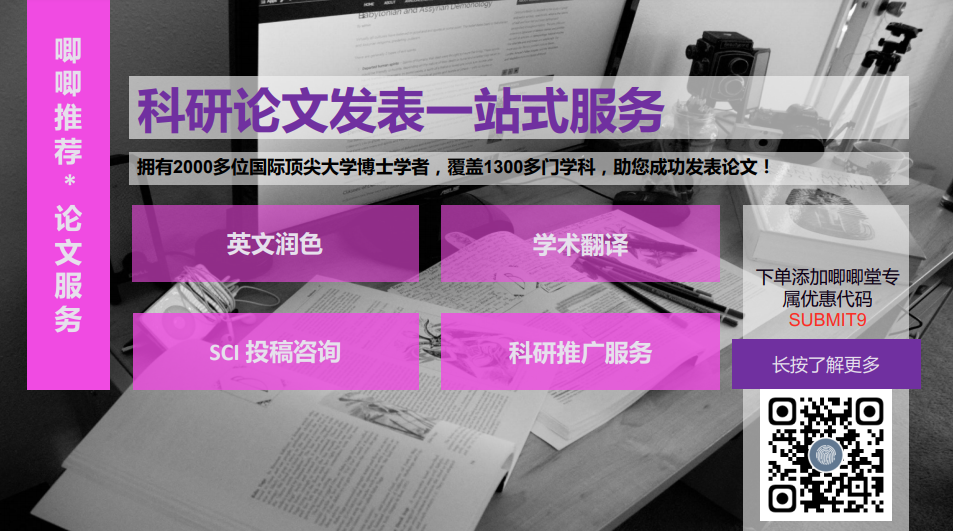
1.走走停停,我的心流去哪了?每日令人厌恶的早晨通勤如何以及何时与员工工作时的动机和行为负相关
尽管已有研究表明通勤对于个体和社会具有广泛的消极影响,但是既往研究对于令人厌恶的通勤如何影响员工工作效率却所知甚少。基于自我调节理论和资源保存视角,本文构建的框架解释了令人厌恶的早晨通勤如何通过自主交通行为扰乱这一资源损耗经历对员工工作沉浸造成损害,进而降低员工的工作效率(如,工作投入、主观绩效和面向个体的组织公民行为)。本文进一步阐释了每日的自我控制要求作为边界条件放大了该效应,并且提出员工的基础需求满足可以作为保护因素。两个跨期10个工作日的日记研究(研究1共53名员工,411个每日水平的数据;研究2共91名员工,719个每日水平的数据)支持了大部分假设。研究1表明,在当天有高强制性的工作控制要求时,令人厌恶的早晨通勤通过低水平心流体验影响员工每日的工作投入,员工的自主性需求和胜任力需求满足减缓了该交互作用。研究2排除了消极情感和紧张的替代性解释,并额外发现自我损耗在厌恶型通勤与工作效率之间的中介作用以及重复了胜任需求满足的三阶交互作用。本文批判性地讨论了研究发现并思考企业如何干预以让人们更容易产生工作心流体验。
Despite convincing evidence about the general negative consequences of commuting for individuals and societies, our understanding of how aversive commutes are linked to employees’ effectiveness at work is limited. Drawing on theories of self-regulation and by extension a conservation of resources perspective, we develop a framework that explains how an aversive morning commute—a resource-depleting experience characterized by interruptions of automated travel behaviors—impairs employees’ immersion in uninterrupted work (i.e., flow), which in turn reduces employee effectiveness (i.e., work engagement, subjective performance, and OCB-I). We further delineate theoretical arguments for daily self-control demands as a boundary condition that amplifies this relation and propose the satisfaction of employees’ basic needs as protective factors. Two diary studies across 10 workdays each (Study 1: 53 employees, 411 day-level data points; Study 2: 91 employees, 719 day-level data points) support most of our hypotheses. Study 1 demonstrates that daily aversive morning commutes negatively affect employees’ daily work engagement through lower levels of flow experiences, but only on days with high impulse control demands. In addition, we find initial support that employees’ general autonomy and competence needs satisfaction attenuate this interaction. Study 2 rules out alternative mechanisms (negative affect and tension), demonstrates ego depletion as an additional mediator of the relation between aversive morning commutes and work effectiveness, and replicates the hypothesized three-way interaction for daily competence need satisfaction. We critically discuss the findings and reflect on corporate interventions, which may allow people to more easily flow to and at work.
论文原文:Gerpott, F. H., Rivkin, W., & Unger, D. (2022). Stop and go, where is my flow? How and when daily aversive morning commutes are negatively related to employees’ motivational states and behavior at work. Journal of Applied Psychology, 107(2), 169–192.
2.职场无礼遭遇:一项关于职场无礼行为的构念效度和诺莫网络的元分析
尽管职场无礼在过去二十年受到了组织研究持续的关注,但该构念的效度,尤其是对比其他类型的职场虐待一直受到反复质疑。同时,无礼遭遇前因的有待研究也导致对其诺莫网络的理解不够完整。使用Schmidt和Hunter的随机效应元分析方法,本文通过检验职场无礼的信度、聚合效度和区分效度验证了这一构念的有效性,并且验证了职场无礼超过其他类型的职场虐待的增长预测效度。本文也基于加害者掠夺框架(Perpetrator predation framework)系统地研究了职场无礼遭遇的前因以拓展其诺莫网络。基于105个独立样本和51008名参与者的数据,职场无礼的构念效度得到了稳健支持。此外,人口特征(性别、种族、阶层和任期)、人格特质(宜人性、尽责性、神经质、消极情感和自尊)以及情境因素(感知不文明氛围和社会支持氛围)是职场无礼遭遇的重要前因,并且情境因素与其有着更强的联系。基于457名参与者的补充研究进一步支持了职场无礼的构念效度。
Although workplace incivility has received increasing attention in organizational research over the past two decades, there have been recurring questions about its construct validity, especially vis-à-vis other forms of workplace mistreatment. Also, the antecedents of experienced incivility remain understudied, leaving an incomplete understanding of its nomological network. In this meta-analysis using Schmidt and Hunter’s [Methods of meta-analysis: Correcting error and bias in research findings (3rd ed.), Sage] random-effect meta-analytic methods, we validate the construct of incivility by testing its reliability, convergent and discriminant validity, as well as its incremental predictive validity over other forms of mistreatment. We also extend its nomological network by drawing on the perpetrator predation framework to systematically study the antecedents of experienced incivility. Based on 105 independent samples and 51,008 participants, we find extensive support for incivility’s construct validity. Besides, we demonstrate that demographic characteristics (gender, race, rank, and tenure), personality traits (agreeableness, conscientiousness, neuroticism, negative affectivity, and self-esteem), and contextual factors (perceived uncivil climate and socially supportive climate) are important antecedents of experienced incivility, with contextual factors displaying a stronger association with incivility. In a supplementary primary study with 457 participants, we find further support for the construct validity of incivility. We discuss the theoretical and practical implications of this study.
论文原文:Yao, J., Lim, S., Guo, C. Y., Ou, A. Y., & Ng, J. W. X. (2022). Experienced incivility in the workplace: A meta-analytical review of its construct validity and nomological network. Journal of Applied Psychology, 107(2), 193–220.
3.正念和工作要求对一周工作日内员工动机和绩效的影响轨迹:夹带理论的视角
员工绩效在以往研究往往被视作对员工行为一个静态单时点的快照。然而,认为绩效会随时间波动的研究所采取的时间框架与理论存在脱节。为了让两者联系更为紧密,本文基于卷吸理论(Entrainment Theory;形容原流体轨迹随新流体轨迹的介入而变化)探究了员工动机和绩效在5个工作日内的轨迹变化。本文假设在一周工作时间内动机控制(基于注意力调配的目标追求维持过程)与绩效之间存在下滑的关系轨迹。基于自我决定理论,本文假设特质正念通过影响动机控制与绩效下滑轨迹负相关。最后本文基于特质激活理论提出,只有当工作要求较高时,正念才能通过动机控制轨迹间接影响绩效轨迹,基于151名医疗器械公司的全职员工持续一周工作日、每日收集两次的数据,本文构建个体间的轨迹对假设关系进行的检验支持了假设。在一周工作日内动机控制和绩效都存在下滑轨迹。进一步地,工作要求有条件地调节了正念基于动机控制轨迹对绩效轨迹的间接影响。本文还讨论了动机、绩效、卷吸和正念的动态化理论和实践启示。
Employee performance is commonly investigated as a static, one-time snapshot of prior employee behaviors. For the studies that do acknowledge that performance fluctuates over time, the timeframe decision is disconnected from theoretical underpinnings. To make this connection clearer, we draw on entrainment theory and investigate trajectories in motivation and performance across the 5-day workweek. We hypothesize that both motivational control (i.e., staying on course and sustaining effort in pursuit of goals through the redirection of attention) and performance have a declining trajectory across the workweek. Drawing on self-determination theory, we also hypothesize that trait-based mindfulness (i.e., nonjudgmental present moment attention and awareness) negatively relates to the downward trajectory in performance across the workweek via its effect on the trajectory of motivational control. Finally, we take a trait activation theory perspective, hypothesizing that mindfulness is relevant as an indirect influence on performance trajectories through motivational control trajectories only when job demands are high. We test our model using 151 full-time employees in a medical device company. We collected data from participants twice daily across the 5-day workweek. We then use these daily scores to create between-person (e.g., person-centric) trajectories to investigate the proposed relationships. The hypotheses are generally supported. There is a downward trajectory of both motivational control and performance across the workweek. Furthermore, job demands conditionally moderate the indirect effect of mindfulness on performance trajectories through motivational control trajectories. Theoretical and practical implications specific to dynamic motivation and performance, entrainment, and mindfulness literature are discussed.
论文原文:Dust, S. B., Liu, H., Wang, S., & Reina, C. S. (2022). The effect of mindfulness and job demands on motivation and performance trajectories across the workweek: An entrainment theory perspective. Journal of Applied Psychology, 107(2), 221–239.

4.活在当下与心怀感激:正念、感激和员工帮助行为的多研究调查
感激是促进职场帮助行为的必要条件。因此培育员工感激经验对于依赖团队协作以实现组织目标的现代组织而言十分必要。然而,当前职场一系列复杂的工作要求让员工难以充分关注和感激他们在工作中获得的各种益处。因此,员工感激不仅对于雇主难以提升,而且员工也难以切身体会。尽管如此,已有文献忽略了注意力和意识在促进员工感激当中的作用。本研究检验了代表个体当下注意力的正念可能能够通过激发感激的积极情感和他人导向情感促进员工的帮助行为。两项实验研究、一项两周一次的多源日记研究和一项十天的经验取样研究的结果表明,状态正念通过积极情感和观点采择促进更高水平的感激和亲社会动机,进而促进员工的职场帮助行为。
Gratitude plays an integral role in promoting helping behavior at work. Thus, cultivating employees’ experiences of gratitude represents an important imperative in modern organizations that rely on teamwork and collaboration to achieve organizational goals. Yet, today’s workplace presents a complex array of demands that make it difficult for employees to fully attend to and appreciate the various benefits they receive at work. As such, gratitude is difficult for employers to promote and for employees to experience. Despite these observations, the role of attention and awareness in facilitating employees’ feelings of gratitude is largely overlooked in the extant literature. In this study, we examined whether one notable form of present moment attention, mindfulness, may promote helping behavior by stimulating the positive, other-oriented emotion of gratitude. Across two experimental studies, a semiweekly, multisource diary study, and a 10-day experience sampling investigation, we found converging evidence for a serial mediation model in which state mindfulness, via positive affect and perspective taking, prompts greater levels of gratitude, prosocial motivation, and, in turn, helping behavior at work. We discuss the theoretical and practical implications of our investigation, as well as avenues for the future research.
论文原文:Sawyer, K. B., Thoroughgood, C. N., Stillwell, E. E., Duffy, M. K., Scott, K. L., & Adair, E. A. (2022). Being present and thankful: A multi-study investigation of mindfulness, gratitude, and employee helping behavior. Journal of Applied Psychology, 107(2), 240–262.
5.高权力带来更多的工作要求:权力体验对感知工作要求的动态效应及其对员工工作结果的差异化影响
本文认为心理权力感对权力所有者具有复杂且不一致的影响。基于将工作要求感知视为权力关键结果的定位焦点理论以及挑战性-阻碍性(压力源)框架的新观点,本文认为工作要求将会对员工产生差异化的效应。本文模型阐释了基于权力的工作要求可能会同时对权力所有者产生积极效应(表现为目标促进和意义感)和消极效应(表现为身体不适和焦虑)。通过将工作要求作为一个关键的中介变量,本文综合解释了权力对权力所有者具有的差异化效应。此外对于高神经质的员工,其权力感知促进工作要求感知的效应更强。一项现场试验对全模型进行了检验,第二项实验对权力影响工作要求感知进行了重复研究。
In this work, we consider the complex and discordant effects that psychological power has on powerholders. To do so, we integrate the situated focus theory of power, which identifies perceptions of job demands as a key outcome of power, with new insights from the challenge-hindrance framework, which acknowledges that job demands may both help and hurt employees. Our model delineates how power-induced job demands may simultaneously benefit (manifested as goal progress and meaningfulness) and harm (manifested as physical discomfort and anxiety) powerholders. By identifying job demands as a key mediator we provide an integrative account of the nuanced effects that power has on powerholders. Additionally, we show that the relationship between feeling powerful and perceiving one’s job to be demanding is stronger for employees higher (vs. lower) in neuroticism. We tested our theoretical model in two studies—a field experiment where we tested the full model, and a second experiment where we conceptually replicated the effect of power on perceived job demands. We discuss the theoretical and practical implications of our work.
论文原文:Foulk, T. A., & Lanaj, K. (2022). With great power comes more job demands: The dynamic effects of experienced power on perceived job demands and their discordant effects on employee outcomes. Journal of Applied Psychology, 107(2), 263–278.
6.伤害还是收获:特质共情如何影响领导者在提供负面反馈后的领导有效性
尽管提供负面反馈能够促进员工绩效,但领导有时不愿意向员工提供负面反馈。已有研究将负面反馈提供视为一种令人厌恶但存在潜在益处的管理活动。然而,我们对于负面反馈提供如何影响领导有效性却知之甚少。本文开发并检验的理论模型表明,领导者对负面反馈提供如何做出近端和远端反应取决于他们的特质共情水平。一项经验取样研究的结果表面,高特质共情的领导在向下级提供负面反馈后报告了更低的专注和更高的忧虑。专注和忧虑进而与领导每日的效率感知相关,忧虑还与领导每日的变革领导行为相关。聚焦于单次负面反馈提供的两项后续研究表明,特质共情放大了反馈接收者的消极情感反应对领导决策能力和计划/问题解决等领导有效性的影响程度,并进一步支持了反馈提供过程当中需要考虑特质共情的观点。本文通过将理论重点从接收者转移到提供者为反馈给予过程提供了新的视角,并通过强调共情对领导力的潜在不利影响来挑战当前关于领导者共情的相关研究观点。
Although providing negative performance feedback can enhance employee performance, leaders are sometimes reluctant to engage in this activity. Reflecting this, prior research has identified negative feedback provision as an aversive, yet potentially rewarding, managerial activity. However, little is known about how providing negative feedback impacts the effectiveness of leaders who do so. To shed light on this issue, we develop and test a theoretical model that identifies how leaders’ proximal and distal reactions to providing negative feedback are contingent upon their levels of trait empathy. Supporting our theory, results from an experience sampling study indicate that leaders higher in trait empathy report feeling both less attentive and more distressed after providing subordinates with negative feedback, whereas leaders lower in trait empathy report feeling more attentive and less distressed. Attentiveness and distress, in turn, were associated with leaders’ daily perceptions of their effectiveness; distress was also associated with leaders’ daily enactment of transformational leadership behavior. Results of two subsequent studies focused on single episodes of negative feedback provision revealed that trait empathy amplifies the extent to which feedback recipients’ negative emotional reactions impact additional leader effectiveness criteria (e.g., executive functioning and planning/problem-solving), further supporting the need to account for the crucial role of trait empathy in the feedback-provision process. Altogether, our research provides a novel perspective on the feedback-giving process by shifting the focus of theorizing from the recipient to the provider, while challenging current thinking about leader empathy by highlighting its potential downside for leadership.
论文原文:Simon, L. S., Rosen, C. C., Gajendran, R. S., Ozgen, S., & Corwin, E. S. (2022). Pain or gain? Understanding how trait empathy impacts leader effectiveness following the provision of negative feedback. Journal of Applied Psychology, 107(2), 279–297.425–443.
7.资源杠杆,资源损耗:一个关于多团队成员身份的多层次视角研究
多团队成员身份(Multiple Team Membership, MTM)是一种让组织研究和实践都面临重大挑战的复杂现象。本文探究了当前研究关注甚少的MTM多层次性质。本文开发的基于资源的理论框架促进了我们对公司MTM的前因以及生产力后效,以及个体MTM和公司MTM对个体情绪耗竭的协同效应。基于145家德国组织的19803名员工样本的数据,本文发现MTM在知识密集型以及人手不足的公司最为盛行,并且公司MTM与随后的公司生产力之间存在倒U形关系(而非正相关的线性关系)。此外,本文发现个体MTM和公司MTM对个体压力感知存在交互效应,个体MTM和情绪耗竭之间的正向关系只有在公司MTM更高的公司才存在。总之,MTM对公司层面的生产力具有潜在的积极效应,但同时也可能会对个体层面的员工幸福感产生损害。
Multiple team membership (MTM) is a complex phenomenon that poses significant challenges for organizational research and practice. In this article, we delve into the multilevel nature of MTM, which has not received adequate research attention to date. We develop a resource-based framework that advances our understanding of the antecedents and productivity consequences of firm MTM, and the synergistic effects of individual MTM and firm MTM on an individual’s emotional exhaustion. Using a sample of 19,803 employees from 145 German organizations, our analyses reveal that MTM is most prevalent in knowledge-intensive and understaffed firms, and that firm MTM has an inverted U-shaped (rather than a positive linear) relationship with subsequent firm productivity. In addition, we find that individual MTM and firm MTM interactively shape individual stress perceptions, such that positive linkages between individual MTM and emotional exhaustion are significant only in firms with higher (but not lower) firm MTM. Together, these findings suggest that MTM has the potential to lead to firm-level productivity gains but, at the same time, may take a toll on individual employees’ well-being.
论文原文:Berger, S., van de Brake, H. J., & Bruch, H. (2022). Resource leverage, resource depletion: A multilevel perspective on multiple team membership. Journal of Applied Psychology, 107(2), 298–309.
8.火花闪烁与探寻内心:目标导向对创造力轨迹的差异化效应
为何有些员工在创造力提升和保持方面随着时间比其他人做得更好?尽管过去几十年已有关于员工创造力的大量实证和理论研究,但是我们仍未充分理解创造力的时间和发展方面。基于对创造力动态性质的强调,本文提出创造力轨迹的非单调性以及目标导向解释了个体创意产能(数量)和质量(新颖性和有用性)提升和维持的能力变化。基于一家制造公司的纵向研究的结果表明,由于学习导向的员工努力开发自身技能,他们的创意质量能够随着时间快速提升并维持。而那些绩效导向的员工由于想要展示自身技能进而依赖于能够产生大量创意的已有框架,但这最终会导致他们长期创造力的损害。
Why are some employees better than others at improving and maintaining their creativity over time? Despite decades of empirical study and theory on employee creativity, the temporal and developmental aspects of creativity are far from being fully understood. Emphasizing the dynamic nature of creativity, we propose that creativity trajectories are nonmonotonic, and that goal orientations explain individual variations in the ability to improve and sustain the productivity (number) and quality (novelty and usefulness) of ideas over time. Our findings from a longitudinal study at a manufacturing company suggest that employees with a learning orientation strive to develop their skills and thus improve the quality of their ideas at a faster rate and maintain it over time. Those with a performance orientation seek to demonstrate their skills, relying on existing frameworks that enable a larger number of ideas initially, yet ultimately undermine their creativity in the long term. We discuss the theoretical and practical implications for fueling creativity over time.
论文原文:Miron-Spektor, E., Vashdi, D. R., & Gopher, H. (2022). Bright sparks and enquiring minds: Differential effects of goal orientation on the creativity trajectory. Journal of Applied Psychology, 107(2), 310–318.
9.击中目标:情感文化对适应性绩效的影响
已有研究表明诸如同伴关爱与欢乐等积极情感文化能够预测团队绩效。通过检验美国军队坦克兵团在一段时间内的客观团队绩效模式,本研究对积极情感文化变量对适应性绩效的预测进行了分析。本文还基于行动导向的乐观情感文化和愤怒的消极情感文化对情感文化研究领域进行了扩展。在一次高风险的国际军事训练演习中,55个美国陆军坦克兵团(N=175)完成了资格预审绩效事件和最终资格绩效事件,并在这两次事件前后完成了问卷调查。研究表明,乐观的积极情感文化预测了一种低预审绩效反弹的适应性绩效模式。欢乐和乐观的情感文化都直接预测了最终绩效,但同伴关爱或者愤怒情感文化都不是显著的预测变量。结果表明这些情感文化变量存在自身独特的性质及其与群体的特质情感和凝聚之间的差异。拥有高乐观情感文化的团队更能够在绩效不佳的情况下反弹,这表明提倡乐观文化的组织会产生更具适应力的团队。
Previous research has established the role of positive emotional cultures such as companionate love and joy in predicting team performance. Building on this work, the present study analyzes the role of positive emotional culture variables as predictors of resilient performance by examining patterns of objective team performance in U.S. Army tank crews over time. We also broaden the emotional culture domain by investigating an action-oriented positive emotional culture of optimism and a negative emotional culture of anger. During a high-stakes international military training exercise, 55 U.S. Army tank crews (N = 175) completed a pre-qualification performance event, a final qualification performance event, and surveys at baseline and after both events. The positive emotional culture of optimism predicted a pattern of resilient performance defined as a rebound from poor pre-qualification performance. Emotional cultures of joy and optimism also directly predicted final performance, but neither the emotional culture of companionate love, nor the emotional culture of anger was a significant predictor. Results demonstrate the distinct nature of each of these emotional culture variables, and show that these variables differ from group trait affectivity and cohesion. Teams with a strong emotional culture of optimism were better positioned to rebound in the face of poor performance, suggesting that organizations that promote an optimistic culture develop more resilient teams.
论文原文:Adler, A. B., Bliese, P. D., Barsade, S. G., & Sowden, W. J. (2022). Hitting the mark: The influence of emotional culture on resilient performance. Journal of Applied Psychology, 107(2), 319–327.
推荐
订阅


点击“阅读原文”发现更多未推送经济金融学论文导读!
文章评论